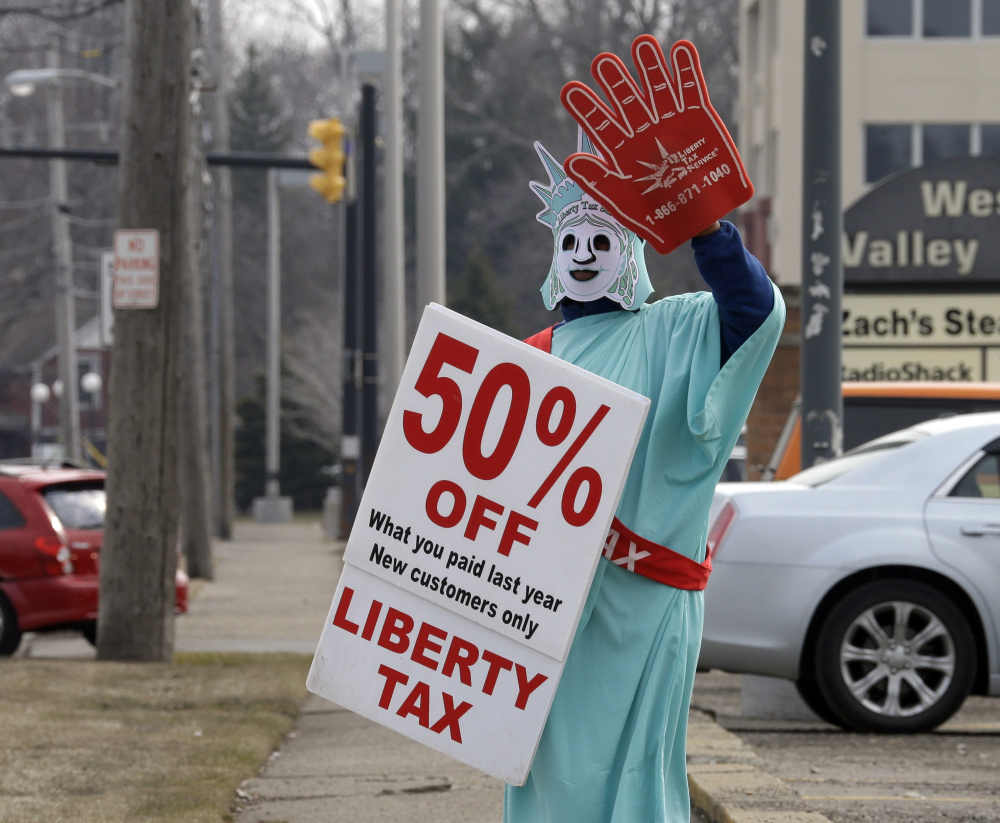WASHINGTON — Cash-strapped Americans anxious for tax refunds are increasingly turning to payment advances, prepaid cards or other costly services when getting tax preparation help, according to new federal data raising concerns among regulators about whether consumers are fully informed about the fees.
Regulators are looking to increase oversight of preparers amid the rise in “refund anticipation checks,” a type of cash advance especially popular among low-income families who receive the Earned Income Tax Credit, the government’s $65 billion cash benefit program. The advances are being marketed as a way to get fast refunds or defer payment of tax preparation costs.
The Consumer Financial Protection Bureau says some consumers have complaints about refund anticipation checks centered on advertising, quality of service or fees.
The bureau is finalizing the first rules on prepaid debit cards, including those for tax refunds, that would require “easy to understand” disclosures upfront about costs and risks.
Refund anticipation checks rose to roughly 21.6 million in 2014, up 17 percent from 2011, according to IRS data provided to The Associated Press. About half the purchasers are EITC recipients; roughly 84 percent are low-income, according to the data. Industry analysts project the payment advances and their fees will become more widespread as tax preparers seek to boost revenue.
Currently, refund anticipation checks and prepaid cards make up 10 percent of industry giant H&R Block’s revenue and more than 20 percent of Liberty Tax Service’s, according to earnings reports.
Both companies said they are committed to providing consumers with the information they need to make tax-filing decisions, including use of refund anticipation checks. They said the payment advances offer added value, such as convenience.
The Internal Revenue Service has been pushing Congress for new authority to regulate the $10.1 billion tax preparation industry after an appeals court last year barred it from requiring tax preparers to undergo background checks and testing.
“It’s the wild, wild West,” said Nina Olson, the IRS’ national taxpayer advocate, describing the current state of the industry. She called the level of risk for abuse in pricing and quality of service unprecedented.
The National Association of Tax Professionals supports certification of providers to ensure a minimum level of competency. But the Institute for Justice, which filed the lawsuit against IRS, says new licensing requirements and other oversight aren’t the answer.
“We should do more to increase competition, not drive independent tax preparers out of the market,” said Dan Alban, an attorney for the group.
The average tax-preparation fee for 2014 returns is $273, up 11 percent from two years ago, according to a survey by the National Society of Accountants. But there’s wide variation, with fees of $400 or more, according to the National Consumer Law Center.
Send questions/comments to the editors.



Success. Please wait for the page to reload. If the page does not reload within 5 seconds, please refresh the page.
Enter your email and password to access comments.
Hi, to comment on stories you must . This profile is in addition to your subscription and website login.
Already have a commenting profile? .
Invalid username/password.
Please check your email to confirm and complete your registration.
Only subscribers are eligible to post comments. Please subscribe or login first for digital access. Here’s why.
Use the form below to reset your password. When you've submitted your account email, we will send an email with a reset code.